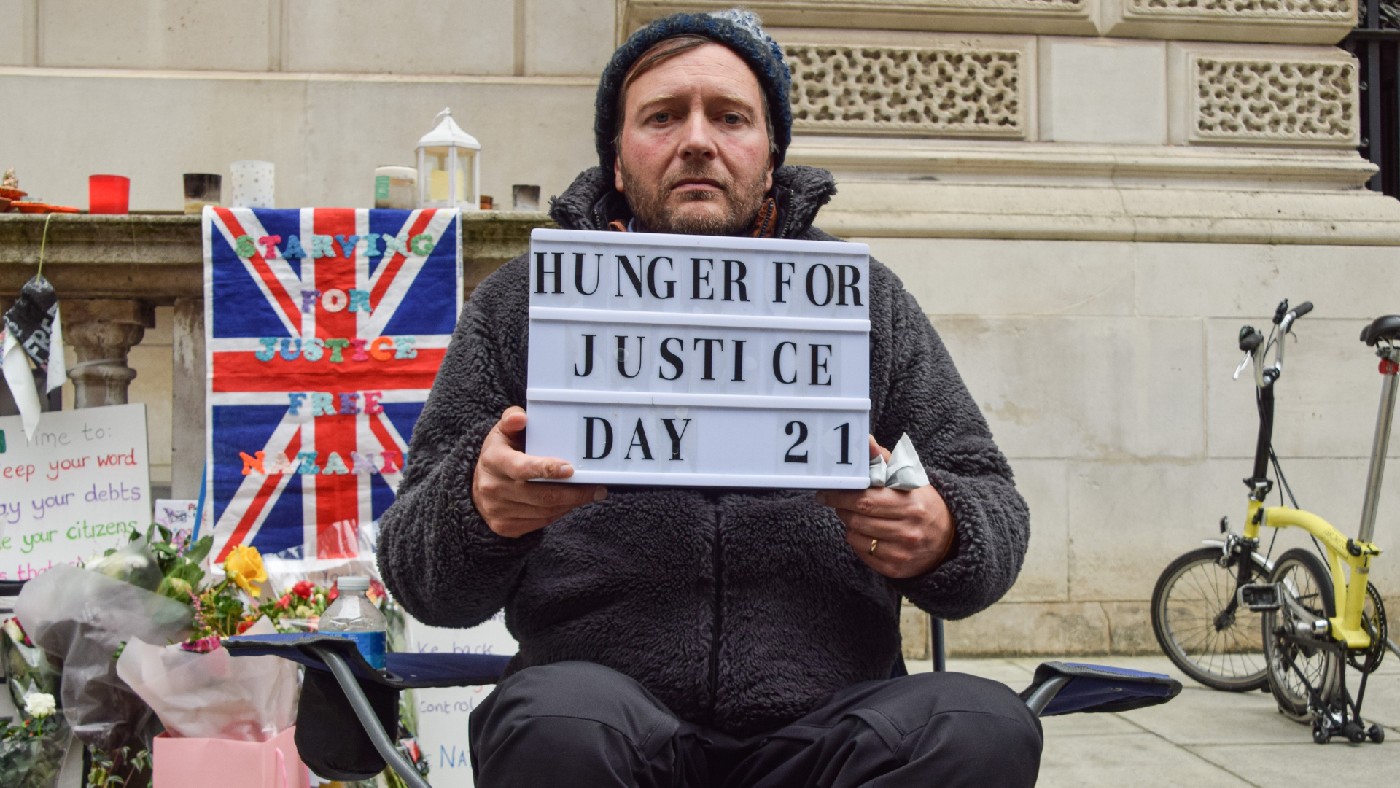Nazanin Zaghari-Ratcliffe: held to a £400m ransom
Boris Johnson has ‘a moral duty to set this right’, said The Observer

A free daily email with the biggest news stories of the day – and the best features from TheWeek.com
You are now subscribed
Your newsletter sign-up was successful
It’s hard to imagine a more devoted husband than Richard Ratcliffe, said Clare Foges in The Times. Since his wife Nazanin Zaghari-Ratcliffe was detained in Iran on trumped-up charges in 2016, he has campaigned tirelessly for her release.
Fearing that she might be given a further sentence, over the past three weeks he “starved himself on Whitehall, a desperate man playing his last card, muscles wasting, body creaking”. His hunger strike has now ended, and his family is still no closer to a solution; after five years of promising to “turn over every stone”, the Government has achieved nothing.
Yet there is a simple solution: ministers could settle the UK’s debt of some £400m to Iran. In 1971, the UK agreed to sell 1,500 tanks to the Iranians. After the Shah fell in 1979, however, “we refused to deliver the tanks but kept the cash” – a bone of contention ever since. It’s clear Zaghari-Ratcliffe won’t be released until the debt is paid. International courts have ruled that we should pay up. So why don’t we?
The Week
Escape your echo chamber. Get the facts behind the news, plus analysis from multiple perspectives.

Sign up for The Week's Free Newsletters
From our morning news briefing to a weekly Good News Newsletter, get the best of The Week delivered directly to your inbox.
From our morning news briefing to a weekly Good News Newsletter, get the best of The Week delivered directly to your inbox.
Because it would be a bad idea to give “an illegitimate hostile theocracy” hundreds of millions in cash, said Henry Hill on Conservative Home – even if there were any guarantee that it would secure Zaghari-Ratcliffe’s release, “which there is not”. It would break sanctions on Iran, which might well use the £400m to “export terror” across the region. And it would be seen as “a ransom payment by other groups which might be tempted to kidnap British citizens”. Ministers cannot ignore all this “because of one human story, however agonising”.
Even so, Boris Johnson has “a moral duty to set this right”, said The Observer. He made a “disastrous blunder” early on in the case, by telling Parliament that Zaghari-Ratcliffe was in Tehran to teach journalism, when she was merely visiting family. This was used by Iran to justify her jailing. He then made a personal promise that the £400m would be paid, to smooth things over with the Iranians.
Ratcliffe believes that setting this price, and then failing to honour the promise, is why his wife is still being held today. At any rate, the Government’s current approach is clearly failing. Johnson needs to “take responsibility and bend his will to freeing Nazanin Zaghari-Ratcliffe”.
A free daily email with the biggest news stories of the day – and the best features from TheWeek.com
-
 The environmental cost of GLP-1s
The environmental cost of GLP-1sThe explainer Producing the drugs is a dirty process
-
 Greenland’s capital becomes ground zero for the country’s diplomatic straits
Greenland’s capital becomes ground zero for the country’s diplomatic straitsIN THE SPOTLIGHT A flurry of new consular activity in Nuuk shows how important Greenland has become to Europeans’ anxiety about American imperialism
-
 ‘This is something that happens all too often’
‘This is something that happens all too often’Instant Opinion Opinion, comment and editorials of the day
-
 How corrupt is the UK?
How corrupt is the UK?The Explainer Decline in standards ‘risks becoming a defining feature of our political culture’ as Britain falls to lowest ever score on global index
-
 Democrats push for ICE accountability
Democrats push for ICE accountabilityFeature U.S. citizens shot and violently detained by immigration agents testify at Capitol Hill hearing
-
 Fulton County: A dress rehearsal for election theft?
Fulton County: A dress rehearsal for election theft?Feature Director of National Intelligence Tulsi Gabbard is Trump's de facto ‘voter fraud’ czar
-
 ‘Melania’: A film about nothing
‘Melania’: A film about nothingFeature Not telling all
-
 Greenland: The lasting damage of Trump’s tantrum
Greenland: The lasting damage of Trump’s tantrumFeature His desire for Greenland has seemingly faded away
-
 Minneapolis: The power of a boy’s photo
Minneapolis: The power of a boy’s photoFeature An image of Liam Conejo Ramos being detained lit up social media
-
 The price of forgiveness
The price of forgivenessFeature Trump’s unprecedented use of pardons has turned clemency into a big business.
-
 Reforming the House of Lords
Reforming the House of LordsThe Explainer Keir Starmer’s government regards reform of the House of Lords as ‘long overdue and essential’